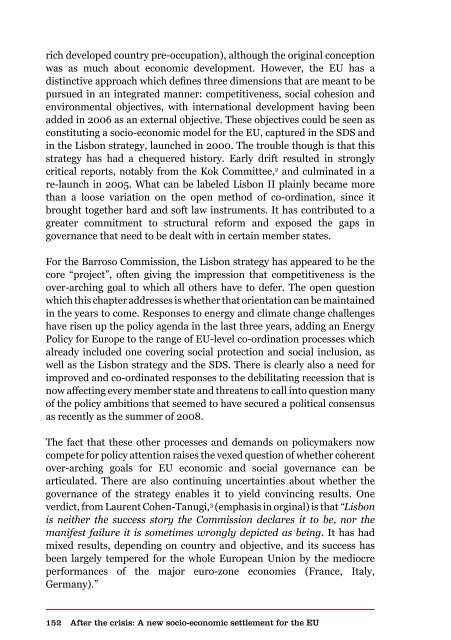Authors Iain Begg | Gabriel Glöckler | Anke Hassel ... - The Europaeum
Authors Iain Begg | Gabriel Glöckler | Anke Hassel ... - The Europaeum
Authors Iain Begg | Gabriel Glöckler | Anke Hassel ... - The Europaeum
You also want an ePaper? Increase the reach of your titles
YUMPU automatically turns print PDFs into web optimized ePapers that Google loves.
ich developed country pre-occupation), although the original conception<br />
was as much about economic development. However, the EU has a<br />
distinctive approach which defines three dimensions that are meant to be<br />
pursued in an integrated manner: competitiveness, social cohesion and<br />
environmental objectives, with international development having been<br />
added in 2006 as an external objective. <strong>The</strong>se objectives could be seen as<br />
constituting a socio-economic model for the EU, captured in the SDS and<br />
in the Lisbon strategy, launched in 2000. <strong>The</strong> trouble though is that this<br />
strategy has had a chequered history. Early drift resulted in strongly<br />
critical reports, notably from the Kok Committee, 2 and culminated in a<br />
re-launch in 2005. What can be labeled Lisbon II plainly became more<br />
than a loose variation on the open method of co-ordination, since it<br />
brought together hard and soft law instruments. It has contributed to a<br />
greater commitment to structural reform and exposed the gaps in<br />
governance that need to be dealt with in certain member states.<br />
For the Barroso Commission, the Lisbon strategy has appeared to be the<br />
core “project”, often giving the impression that competitiveness is the<br />
over-arching goal to which all others have to defer. <strong>The</strong> open question<br />
which this chapter addresses is whether that orientation can be maintained<br />
in the years to come. Responses to energy and climate change challenges<br />
have risen up the policy agenda in the last three years, adding an Energy<br />
Policy for Europe to the range of EU-level co-ordination processes which<br />
already included one covering social protection and social inclusion, as<br />
well as the Lisbon strategy and the SDS. <strong>The</strong>re is clearly also a need for<br />
improved and co-ordinated responses to the debilitating recession that is<br />
now affecting every member state and threatens to call into question many<br />
of the policy ambitions that seemed to have secured a political consensus<br />
as recently as the summer of 2008.<br />
<strong>The</strong> fact that these other processes and demands on policymakers now<br />
compete for policy attention raises the vexed question of whether coherent<br />
over-arching goals for EU economic and social governance can be<br />
articulated. <strong>The</strong>re are also continuing uncertainties about whether the<br />
governance of the strategy enables it to yield convincing results. One<br />
verdict, from Laurent Cohen-Tanugi, 3 (emphasis in orginal) is that “Lisbon<br />
is neither the success story the Commission declares it to be, nor the<br />
manifest failure it is sometimes wrongly depicted as being. It has had<br />
mixed results, depending on country and objective, and its success has<br />
been largely tempered for the whole European Union by the mediocre<br />
performances of the major euro-zone economies (France, Italy,<br />
Germany).”<br />
152<br />
After the crisis: A new socio-economic settlement for the EU

















